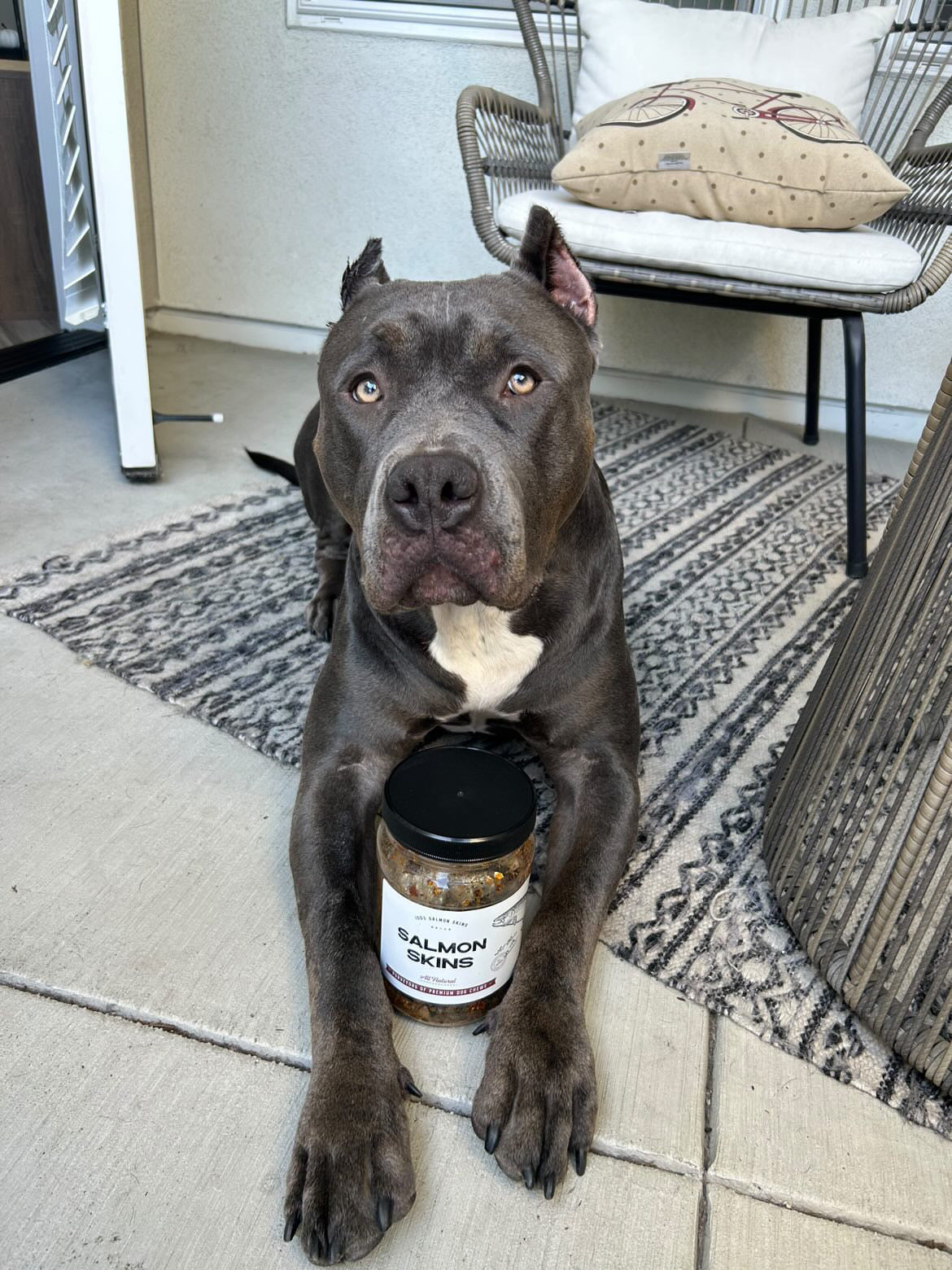The Nutritional Benefits of Salmon for Dogs
In the world of canine nutrition, one food stands out as a true superfood - salmon. This delectable fish, prized by humans for its rich flavor and nutritional value, offers an array of health benefits for our four-legged companions as well. From its high-quality protein content to its abundant omega-3 fatty acids, vitamins, and minerals, salmon isn't just a delicious treat for your dog; it's a powerhouse of nutrients that can contribute to their overall well-being. In this blog, we'll dive deep into the nutritional benefits of salmon for dogs, exploring why this fish deserves a place in your pet's diet and how it can enhance their health in numerous ways.
Omega-3 fatty acid Benefits & their importance for pet health
Not only is salmon known for being a good source of protein and option for dogs with allergies, but its key benefits lie with its concentration of omega-3s. Omega-3 fatty acids are essential components of a pet's diet, playing a crucial role in maintaining their overall health and well-being. Incorporating omega-3-rich sources like salmon into your pet's diet can be a simple yet effective way to ensure they reap the numerous benefits of these essential nutrients.
- Improves Heart Health: Salmon is a rich source of omega-3 fatty acids, particularly eicosapentaenoic acid (EPA) and docosahexaenoic acid (DHA). These essential fatty acids play a pivotal role in heart health by reducing inflammation throughout the cardiovascular system, improving blood vessel function, and lowering blood pressure. Omega-3s are also known to reduce triglycerides, a type of fat in the blood associated with heart disease risk. Additionally, they can help prevent the formation of blood clots, potentially reducing the risk of heart attacks and strokes.
- Supports Healthy Joints: These fatty acids, once incorporated into the body's cell membranes, give rise to anti-inflammatory compounds that help mitigate the production of pro-inflammatory molecules. The same way they reduce inflammation in the cardiovascular system, they reduce inflammation within joints and muscles making them valuable for managing arthritis and joint pain in aging or active pets.
- Improves Skin and Coat: While most of the information regarding Omega-3s seems repetitive, it is widely promoted for the anti-inflammatory properties which is how it promotes healthy, shiny fur and alleviate skin conditions like dryness, itching, and other skin issues. Furthermore, they contribute to maintaining the skin's natural barrier function, preventing moisture loss and keeping the skin hydrated and supple. Omega-3s also support the production of collagen and elastin, crucial proteins that provide skin with its structure and elasticity.
- Supports Cognitive Function & Eye Health: Docosahexaenoic acid (DHA), an omega-3 fatty acid, is fundamental to the proper functioning of the brain and eyes. As highlighted by the National Institutes of Health, DHA constitutes a major structural component of the gray matter in the brain and the retina in the eyes, underscoring its role in cognitive and visual processes. DHA is involved in the synthesis and function of neurotransmitters in the brain, and its deficiency may lead to cognitive and visual impairments. The American Optometric Association also notes the importance of DHA in vision, emphasizing that it plays a key role in maintaining the integrity of the retinal structure and in protecting against age-related macular degeneration and other vision-related conditions. In sum, DHA's foundational presence in the brain and eyes, combined with its role in neural and visual processes, underscores its critical importance for cognitive and visual health.
- Creates a healthy Immune System: According to the National Institutes of Health (NIH), omega-3s can enhance the functioning of immune cells, such as B cells, that play critical roles in recognizing and destroying pathogens. It has been indicated that omega-3s have anti-inflammatory properties which can help regulate and reduce chronic inflammation, a critical aspect of an overactive immune response. The Oregon State University's Linus Pauling Institute points out that omega-3s can improve the body's production of compounds involved in immunity, such as eicosanoids and specialized pro-resolving lipid mediators, thereby promoting resolution of inflammation and bolstering the body's defense against infections.
- Reduces Symptoms of Allergies: Allergic reactions, at their core, involve inflammation and an overactive immune response to certain stimuli. The omega-3 fatty acids in salmon can mitigate this by suppressing the production of inflammatory eicosanoids: Eicosanoids derived from arachidonic acid, an omega-6 fatty acid, promote inflammation. EPA, which is a type of omega-3, competes with arachidonic acid for the enzymes that catalyze the formation of eicosanoids, thus leading to the production of less inflammatory eicosanoids. Allergic reactions often involve the activation of certain subsets of T-cells that promote allergic inflammation. Omega-3s can modulate the differentiation and function of these cells, potentially reducing allergic reactions.
How to incorporate salmon into your pet's diet
Incorporating salmon into your pet's diet can be a great way to provide them with essential nutrients and potentially boost their immune system. You can feed salmon to your pet in many ways: cooked, freeze dried, or dehydrated. If you choose to cook for your dog or cat, make sure you do so with dog safe seasonings or no seasonings at all. There are many treats for dogs and cats, but make sure they do not have any preservatives or added ingredients. Salmon oil is also offered as a way to enhance your dog's current mealtime with flavor and nutrition.
Do dogs like salmon?
While most dogs do enjoy eating this fish, some do not. Some dogs might like the meat, while some might only like to eat the crunchy skin. Each dog is different and sometimes it is a trial and error to find what your dog likes to eat.
Do cats enjoy salmon too?
Cats, much like dogs, can also enjoy the benefits of salmon in their diet. Not only is it a great source of protein and essential nutrients, but they find it to be extremely tasty. Like dog's, it's important to note that some cats may have dietary sensitivities or allergies. Therefore, if you're introducing salmon into your cat's diet for the first time, it's always a good idea to introduce it slowly.

Salmon vs. other Seafood for dogs
When it comes to incorporating seafood into your pet's diet, salmon is often a top choice for many pet owners. Compared to other seafood options, salmon offers a unique nutritional profile that can benefit your furry friend in various ways. One of the key advantages of salmon is its high content of omega-3 fatty acids, specifically EPA and DHA and its low mercury content. However, there are many options of fish and seafood that can be incorporated and mixed into your pet's diet such as shrimp, mussels, krill, carp, and sardines.
What fish is safe for cats to eat?
When it comes to feeding fish to cats, there are a few options that are generally considered safe. Some of the safe fish choices for cats include salmon, carp, haddock, trout, and sardines. These fish are not only rich in protein but also contain essential omega-3 fatty acids that promote overall wellness. However, it's important to note that certain types of fish can potentially contain parasites, so it's always best to thoroughly cook any fish before feeding it to your feline friend.
Parasites in Raw Salmon
Avoid raw salmon due to potential harmful bacteria. Make sure it is either cooked, dehydrated, or freeze-dried. These "cooking" processes will eliminate the potential of salmon poisoning caused from the Neorickettsia helminthoeca parasite. Symptoms of salmon poisoning include vomiting, lack of appetite, fever, diarrhea, swollen lymph nodes, and dehydration.
Farm Raised Salmon vs. Wild Caught Salmon
When it comes to choosing salmon for your four-legged friend, there is often a debate between farm-raised and wild-caught options. Each has its own set of advantages and considerations.
- Farm-raised salmon is bred and raised in controlled environments, providing a consistent supply throughout the year. These fish are typically fed a formulated diet, ensuring they receive the necessary nutrients. This also allows for disease prevention and mortality control.
- Farm-raised salmon from Norway is raised in its natural habitat and not a cramped pool of fish. The ratio of the pens in the fjord is 97.5% water to 2.5% salmon.
- Seafood from Norway is all about sustainability. Since fishing had been part of their heritage for more than 2,000 years, taking care of the sea for the next generation is part of their culture.
On the other hand, wild-caught salmon is sourced from their natural habitats. These fish feed on their ocean and river counterpart. Wild caught fish has been noted to be lower in fat (including Omega-3s) but a higher vitamin/mineral density. When it comes to comparing the two, both are excellent resources for providing your pet with Omega-3s. Pretty much all Atlantic Salmon is farmed; if you're looking for wild-caught, always avoid Atlantic and look for Alaskan (where fish farming is banned) or Pacific.
Alternative Superfoods for dogs that contain omega-3 fatty acids
- Flaxseed: These are rich in alpha-linolenic acid (ALA), a type of plant-based omega-3 fatty acid. While dogs can convert some ALA to the more potent forms of omega-3s (EPA and DHA), the conversion rate is relatively low. Nevertheless, flaxseed can still contribute to the overall omega-3 intake.
- Fish Oil: This is one of the most concentrated sources of omega-3s for dogs. Fish oils from sardines, anchovies, mackerel, and herring are especially beneficial. These oils provide both EPA and DHA, the primary omega-3s associated with health benefits.
- Krill Oil: Derived from tiny crustaceans known as krill, this oil is a potent source of EPA and DHA. Additionally, krill oil contains astaxanthin, a powerful antioxidant that can benefit dogs' health.
- Chia Seeds: These tiny seeds are also a good source of ALA. They can be sprinkled on top of a dog's food or soaked in water to create a gel-like consistency that can be mixed into their meals.
- Green-lipped Mussel: Mussels are not only a source of omega-3s but also contain other beneficial compounds for joint health.
- Algal Oil: Derived from algae, this is a vegetarian source of DHA. It can be especially useful for dogs that may have fish allergies.
Is it safe to feed salmon to my pet every day?
Feeding salmon to your pet every day can be safe. It is important that your dog is getting the necessary amount of Omega-3s, but it does not have to always be salmon. While salmon is considered a superfood for dogs, there are many other aquatic animals that contains omega-3s that are safe and tasty. Incorporating additional healthy snacks to your pet's diet is not only essential to their health, but to keeping them happy as well.







